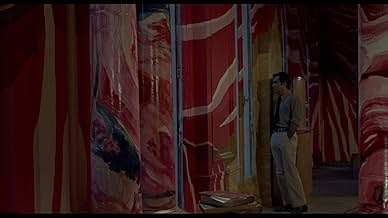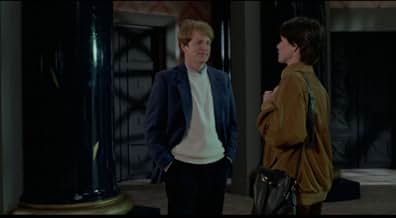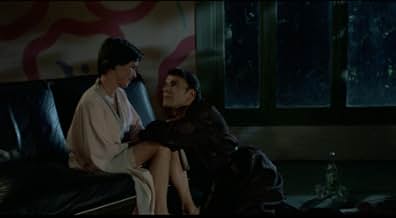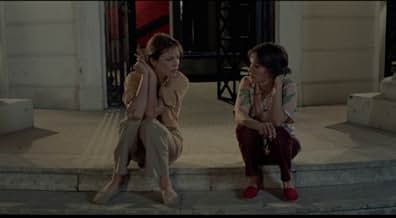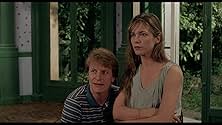A play within a play within a play within a play. Actors perform a play in a house; an audience member invites them to work in his own home improvising a play around his own life. The line b... Read allA play within a play within a play within a play. Actors perform a play in a house; an audience member invites them to work in his own home improvising a play around his own life. The line between fiction and reality blurs.A play within a play within a play within a play. Actors perform a play in a house; an audience member invites them to work in his own home improvising a play around his own life. The line between fiction and reality blurs.
- Awards
- 1 nomination total
Featured reviews
Stars two larger than life actors. Jane birkin, as in the "birkin bag" and geraldine chaplin, daughter of charlie chaplin. As the description says, it's a play, within a play. Within a play. Confusing. This one is quite ethereal. Not quite sure what's going on, pretty hard to follow. Even more so with the subtitles, as it's in french. And most of the reviewers don't seem to know what's really going on either, so I'm not alone. The audience is invited into the house of the people living their lives. Directed by jacques rivette. He has won numerous film fest awards. Some similarities to "synecdoche new york" from 2008, where phillip hoffman hires people to make a real time play about his own life. That one has a more cohesive plot... the lead is slowly losing track of reality, and it gets more and more confusing as the actors try to keep up with with the lead, who is coming undone. They are both hard to follow. For those with the patience.
I think the reason that Rivette is the least popular -- yet by far the most secret, profound and precious -- of the New Wave directors is that he can't be pinned down to a belief. He isn't political, though corporate conspiracies are a factor in many of his films; he isn't an occultist, though his films are filled with Zodiacal symbols, the tarot, magicians; he isn't interested in putting humans under the microscope like Rohmer, though he is minutely attentive to what breaks people apart and brings them together. No; rather, politics, the occult, and humanity are like the vines tying together the raft through which he floats in the void. They are methods to generate material, curiosity and, as lit students would say, a narrative where none necessarily exists. I hope I'm making this clear -- Rivette actually LONGS FOR a worldwide political conspiracy, preferably controlled by a dark magus operating from some deceptively plain apartment in Paris, with the whole human comedy under his spell, because he knows that the alternative, what most people call "reality," would be soul death. He wants more mystery, more confusion, more action. Unlike Godard, he isn't looking for utopias, certainly not those that can be brought about by politics; he wants the world to be as it is, in all its unfathomable, malevolent, messy beauty.
As Jean-Pierre Kalfon says in L'Amour Par Terre one of Rivette's most insidious and fascinating films, by the way -- "I don't want to make life better than it is; I want life." Rivette, like many filmmakers who have disavowed their faith, has really only sublimated his religious quest. His obsession with the creative process, its false starts, abrupt detours and unknown destinations, is unmistakably of a spiritual nature. As it turns out, he is obsessed with stories because the world as we know it exists in order to contain them. For Rivette, God is not an obscure savior ( what are we being saved from? ) but a generator of fictional material, the ultimate creative artist. If the other world is defined by its permanence, its frozen perfection, this one must contain everything that can possibly exist, and the human artist, such as Rivette, then becomes like a sort of middleman between heaven and earth -- he gives form to the transitory, thus translating it for eternity.
Rivette's "strangeness" can be boiled down to his attempt to mirror God's mind by disavowing any ultimate truth. God requires stories in order not to be bored; stories require a world ruled by space and time where they can play out in a bounded setting, with a beginning and end; the world requires life in order to act out these stories. Stories, in short, require that we die. The two words that best describe Rivette's movies, "dark" and "childlike," come from the fact that, to accept that we are in a virtual, fictional realm, you must become as naive as a child for whom death is not real, yet who is subconsciously haunted by what it might mean. We die, but only because we're in a play. We die as children, but the curtain eventually rises ( he finally gives us a peek at what's behind it in his presumably final film, Marie et Julien. ) All this and more is part of why Rivette is so successful at blending the occult and the everyday there is nothing more occult than the fact that we're here at all, pretending we know what we're doing.
As Jean-Pierre Kalfon says in L'Amour Par Terre one of Rivette's most insidious and fascinating films, by the way -- "I don't want to make life better than it is; I want life." Rivette, like many filmmakers who have disavowed their faith, has really only sublimated his religious quest. His obsession with the creative process, its false starts, abrupt detours and unknown destinations, is unmistakably of a spiritual nature. As it turns out, he is obsessed with stories because the world as we know it exists in order to contain them. For Rivette, God is not an obscure savior ( what are we being saved from? ) but a generator of fictional material, the ultimate creative artist. If the other world is defined by its permanence, its frozen perfection, this one must contain everything that can possibly exist, and the human artist, such as Rivette, then becomes like a sort of middleman between heaven and earth -- he gives form to the transitory, thus translating it for eternity.
Rivette's "strangeness" can be boiled down to his attempt to mirror God's mind by disavowing any ultimate truth. God requires stories in order not to be bored; stories require a world ruled by space and time where they can play out in a bounded setting, with a beginning and end; the world requires life in order to act out these stories. Stories, in short, require that we die. The two words that best describe Rivette's movies, "dark" and "childlike," come from the fact that, to accept that we are in a virtual, fictional realm, you must become as naive as a child for whom death is not real, yet who is subconsciously haunted by what it might mean. We die, but only because we're in a play. We die as children, but the curtain eventually rises ( he finally gives us a peek at what's behind it in his presumably final film, Marie et Julien. ) All this and more is part of why Rivette is so successful at blending the occult and the everyday there is nothing more occult than the fact that we're here at all, pretending we know what we're doing.
There are reasons that Rivette is the least known of the New Wave directors..
For some this will feel like a slow drag (the director's cut is running 169mn long), but a few others will enjoy the blend of theatre and life itself that turns into one big messy, ecstatic stew, bubbling over with emotions, both performed and deeply felt.
If you ever feel tired of the noise, the speed, the clutter of modern cinema, take a nice long (in this case, 169 minutes long - in the Director's Cut) break from all of it with a Jacques Rivette film; it's an experience like no other. As far from "art for art's sake" as it is from the mainstream, "Love On The Ground" is simultaneously very simple and very complicated: it's about the artistic process, the way life influences art (and vice versa), the quest for love, random human encounters (in the metro, in a bar), and magical visions of the future! It's not for every taste or mood, but if you are in the right mood (I was), you'll probably find it refreshingly unhurried and thoroughly absorbing. *** out of 4.
I feel lost and out to sea watching this stuff but maybe that's how you're meant to feel? It's like you are watching the rites of a cult. Do you even want to understand? Not me, not really. I have this strong feeling that Rivette is a mystic.
The outline of the plot is that you have three friends Emily, Charlotte, and a guy who I think was called Silvano, they do a play, in an apartment, the idea is that the audience turn up and watch in silence, whilst being directed around the apartment by a guide. Obviously this is not something you can do for a large audience. Anyway I quite like the idea, although the jostling would be unbearable. The play they are doing is basically a theft of an early play from a guy called Roquemaure, who just happens to be in the audience.
It's also improvised as Silvano is being naughty and is getting himself drunk in reality rather than just drinking ginger ale from the whisky bottle prop. So Roquemaure is appreciating this anyway and decides he's going to get these three Thespians to act in a new play of his, which he is going to get them to do in the same style, i.e. the audience will follow the players around his mansion. So this is like mutual theft, Silvano has stolen Rocquemaure's play, Rocquemaure steals Silvano's style. It's not the first act of theft we're going to see here, Rocquemaure gets one of the actresses as a supposed audition to do an ad lib, the results of which he then impregnates the play with. Rivette really rubs this in towards the end Rocquemaure keeps on writing down things that people say to him for incorporation in future plays. So one of the points of the film perhaps is that art and life are really the same thing, and that artists steal from each other. There are also allusions to Rocquemaure's script being modified by his butler/famulus Virgil behind the scenes. That is that artists are collagists, collaborators, plagiarists, in short not so auteurist as they would have us believe.
Anyway it becomes clear that the play Rocquemaure is putting on is really an almost unadulterated transcript of a real life ménage à trois involving himself, the magician Paul, and a woman called Beatrice, set in the very places it happened. Paul is there the whole film observing the rehearsals and sticking his oar in. Rocquemaure as a high jest perhaps, has a woman, Emily, play Paul's part and gives him the name Troppman. Obviously there are romantic liaisons going on throughout this.
This is a film that may well reward study, there's too much to take in, too many implications. What I did catch though were the numerous implications and insights about the creative process. One further one is that it becomes clear that one of the main motivating factors for Emily and Charlotte is the cash and they probably would have stopped working on the play without it, as they had lost belief. There are probably religious connotations, Rocquemaure is like some sort of Wagnerian God controlling all of these puppets.
The film is also very playful, at first we think that some of Paul's magic or some of the magic inherent in the magnificently particoloured villa may be malfeasant. However, like in a Robbe-Grillet movie, it's is all heavily disclaimed at some point, all we are watching is a fantasy.
I love this movie.
The outline of the plot is that you have three friends Emily, Charlotte, and a guy who I think was called Silvano, they do a play, in an apartment, the idea is that the audience turn up and watch in silence, whilst being directed around the apartment by a guide. Obviously this is not something you can do for a large audience. Anyway I quite like the idea, although the jostling would be unbearable. The play they are doing is basically a theft of an early play from a guy called Roquemaure, who just happens to be in the audience.
It's also improvised as Silvano is being naughty and is getting himself drunk in reality rather than just drinking ginger ale from the whisky bottle prop. So Roquemaure is appreciating this anyway and decides he's going to get these three Thespians to act in a new play of his, which he is going to get them to do in the same style, i.e. the audience will follow the players around his mansion. So this is like mutual theft, Silvano has stolen Rocquemaure's play, Rocquemaure steals Silvano's style. It's not the first act of theft we're going to see here, Rocquemaure gets one of the actresses as a supposed audition to do an ad lib, the results of which he then impregnates the play with. Rivette really rubs this in towards the end Rocquemaure keeps on writing down things that people say to him for incorporation in future plays. So one of the points of the film perhaps is that art and life are really the same thing, and that artists steal from each other. There are also allusions to Rocquemaure's script being modified by his butler/famulus Virgil behind the scenes. That is that artists are collagists, collaborators, plagiarists, in short not so auteurist as they would have us believe.
Anyway it becomes clear that the play Rocquemaure is putting on is really an almost unadulterated transcript of a real life ménage à trois involving himself, the magician Paul, and a woman called Beatrice, set in the very places it happened. Paul is there the whole film observing the rehearsals and sticking his oar in. Rocquemaure as a high jest perhaps, has a woman, Emily, play Paul's part and gives him the name Troppman. Obviously there are romantic liaisons going on throughout this.
This is a film that may well reward study, there's too much to take in, too many implications. What I did catch though were the numerous implications and insights about the creative process. One further one is that it becomes clear that one of the main motivating factors for Emily and Charlotte is the cash and they probably would have stopped working on the play without it, as they had lost belief. There are probably religious connotations, Rocquemaure is like some sort of Wagnerian God controlling all of these puppets.
The film is also very playful, at first we think that some of Paul's magic or some of the magic inherent in the magnificently particoloured villa may be malfeasant. However, like in a Robbe-Grillet movie, it's is all heavily disclaimed at some point, all we are watching is a fantasy.
I love this movie.
Did you know
- TriviaThe 2 main characters are called Emily and Charlotte. This is probably a reference to the Brontë sisters, especially in view of the fact that the following film by Rivette was Wuthering Heights (Hurlevent).
- Alternate versionsThere is also a 2 hour and 48 minute version.
- ConnectionsReferences Nashville (1975)
- How long is Love on the Ground?Powered by Alexa
Details
- Runtime2 hours 5 minutes
- Sound mix
Contribute to this page
Suggest an edit or add missing content



